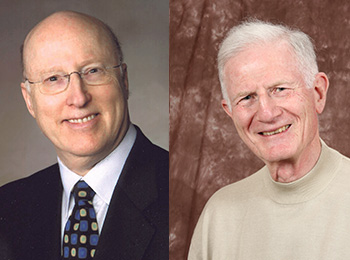TORONTO — While Rabbi Jerry Steinberg and Rabbi Michael Stroh have had divergent career paths, the two Reform clergy are the sole Canadians being honoured for their 50 years in the rabbinate at this month’s 126th annual convention of the Central Conference of American Rabbis (CCAR).
Each year, the CCAR, the principal organization of Reform rabbis in the United States and Canada and the largest and oldest rabbinical organization in the world (it was founded in 1889), celebrates its members who have reached the 50-year mark.
At this year’s convention, to be held March 15-18 in Philadelphia, CCAR will recognize 27 member rabbis ordained in 1965. The convention will also feature workshops, speakers and a hands-on social justice project.
“We’re very proud, as an organization, to honour these individuals who have served their communities in such unique and meaningful ways,” Rabbi Steven Fox, CEO of the CCAR, said in a statement.
Both Rabbi Steinberg, who was born and raised in Regina, and Rabbi Stroh, who is originally from New York City but is a dual American-Canadian citizen, were ordained at the Hebrew Union College-Jewish Institute of Religion – Rabbi Steinberg at the school’s Cincinnati campus and Rabbi Stroh at its New York campus.
“I feel great,” Rabbi Steinberg, 79 and a resident of Thornhill, said of the honour.
Retired for six years, he continues to work as part-time rabbi at a small synagogue in Ajax, B’nai Shalom v’Tikvah – a post he’s held for 12 years.
“It’s a great congregation,” he said. “I enjoy them, and they enjoy me. It’s a shidduch.”
Rabbi Steinberg spent 35 years working as a clinical psychotherapist in Toronto, specializing in dreams, past-life regression and psychogenic illnesses.
Following his ordination, he spent two years living in an ashram in the interior of British Columbia exploring yoga and meditation. He subsequently moved to Winnipeg and became founding rabbi of Temple Sholom, where he worked for five years.
Rabbi Steinberg was later hired by the federal government as a consultant in yoga, meditation and altered states of consciousness, subjects he has lectured widely on, often to Jewish groups.
“They had this program called the Non-Medical Use of Drugs Directorate,” he explained. “They thought yoga and meditation might help young people stay clear of drugs, so I became the consultant.”
He has also taught comparative mysticism and meditation at the University of North Dakota and Jewish history and literature at the University of Manitoba.
“The area of Judaism I relate most to is Kabbalah, which means to receive from, or connect with, God,” Rabbi Steinberg said of the link between eastern spiritual practices and Judaism. “The word ‘yoga’ also means to connect to God.”
He authored Melting: Poems of a Frozen Man, published 1992, and Rogue Rabbi: A Spiritual Quest from Seminary to Ashram and Beyond, a memoir published in 2012, and is working on a novel about the interface between sexuality and spirituality.
“I’ve had an interesting life,” he mused.
Rabbi Stroh, 76, moved to Toronto a year after his ordination.
He met the late Heinz Warschauer, the then director of education at Holy Blossom Temple, at a leadership training program in the United States, and Warschauer asked him to join Holy Blossom as an assistant to Rabbi Gunther Plaut.
Rabbi Stroh spent five years at Holy Blossom before helping a group of young congregants moving further north to found Thornhill’s first Reform synagogue, Temple Har Zion.
He spent 35 years as spiritual leader of Temple Har Zion, where he established an adult education program, which he described as one of his proudest accomplishments. “People participated [in it] far beyond entry level,” he noted.
He continues to teach there, as well as at Holy Blossom.
Rabbi Stroh has, over the years, made substantial contributions to the Reform movement: he chaired the Reform Round Table: A Discussion on the Content of Reform Judaism, under the auspices of the CCAR; he participated in the writing of the New Reform Principles, released in 1999; he founded and was president of the Reform Zionist organization, Arza Canada and he was the past chair of Arzenu: International Federation of Reform and Progressive Religious Zionists.
Raised in a Conservative household, he said he “was drawn to the Reform movement because I felt I could participate in it in an honest way, in terms of what I believe and the kind of movement it is, which is open to different points of view.”
